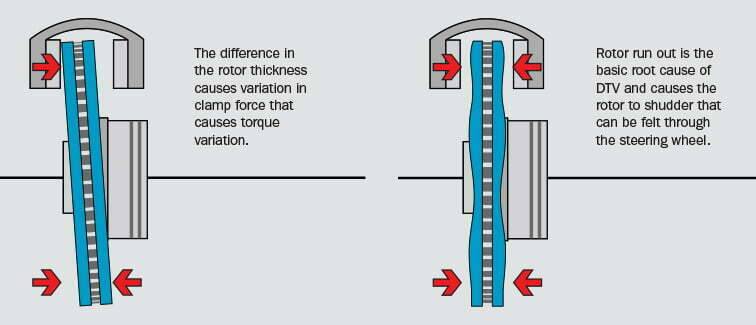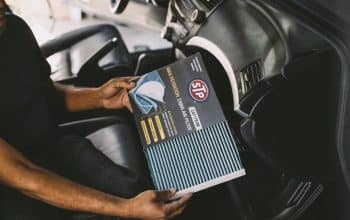The steering wheel shakes when braking due to warped brake rotors or unbalanced wheels. Immediate inspection and repair are essential for safety.
A shaking steering wheel while braking can be unnerving and unsafe. This issue often stems from warped brake rotors, which cause uneven contact with brake pads. Unbalanced wheels or worn suspension components can also contribute to this problem. Ignoring these signs may lead to further damage and increased repair costs.
Promptly addressing the root cause ensures your vehicle’s safety and optimal performance. Regular maintenance and timely inspections can prevent such issues, providing a smooth and secure driving experience. If you notice the steering wheel shakes, consult a professional mechanic immediately. This proactive approach safeguards you and your vehicle from potential hazards.

Credit: www.fordforums.com
Possible Causes Of Shaky Steering Wheel While Braking
A shaking steering wheel while braking can be alarming. Understanding the possible causes helps maintain your vehicle’s health and ensures safety. This section dives into the most common reasons behind a shaky steering wheel when you brake.
1. Warped Brake Rotors
Brake rotors can warp over time due to excessive heat. Warped rotors cause the brake pads to make uneven contact, leading to a shaking steering wheel. Regularly checking and maintaining your brake rotors helps prevent this issue.
2. Worn Brake Pads
Brake pads wear down with use. Worn brake pads may not grip the rotors properly, causing vibrations that can be felt in the steering wheel. Replacing worn brake pads ensures smooth braking and prevents steering wheel shakes.
3. Imbalanced Tires
Imbalanced tires can cause your steering wheel to shake, especially during braking. Tires need balancing to ensure even weight distribution. Regular tire balancing helps avoid this problem.
4. Loose Wheel Bearings
Loose or damaged wheel bearings affect the stability of the wheel. This instability can cause the steering wheel to shake when braking. Inspect and replace faulty wheel bearings to maintain a smooth ride.
5. Suspension Issues
Your car’s suspension system plays a crucial role in handling and stability. Worn-out suspension components like bushings or struts can lead to vibrations felt through the steering wheel. Regular suspension checks and maintenance are essential.
6. Brake Caliper Problems
Brake calipers can stick or seize, causing uneven braking force. This uneven force results in a shaky steering wheel. Inspecting and maintaining brake calipers ensures they function properly.
| Possible Cause | Explanation | Solution |
|---|---|---|
| Warped Brake Rotors | Uneven contact with brake pads | Check and replace rotors |
| Worn Brake Pads | Poor grip on rotors | Replace brake pads |
| Imbalanced Tires | Uneven weight distribution | Balance tires |
| Loose Wheel Bearings | Wheel instability | Inspect and replace bearings |
| Suspension Issues | Worn-out components | Check and maintain suspension |
| Brake Caliper Problems | Uneven braking force | Inspect and maintain calipers |

Credit: comtiresco.com
Worn Brake Rotors
Steering wheel shakes when braking can be alarming. One common cause is worn brake rotors. Brake rotors are crucial for smooth braking. When they wear out, it affects the entire braking system. Let’s explore the issues caused by uneven and warped brake rotors.
Uneven Brake Rotors
Uneven brake rotors are a frequent culprit behind steering wheel shakes. When brake rotors wear unevenly, they create an inconsistent surface. This inconsistency causes vibrations that travel up to the steering wheel.
Signs of uneven brake rotors include:
- Shaking steering wheel during braking
- Inconsistent braking performance
- Strange noises while braking
Causes of uneven brake rotors:
- Poor-quality brake pads
- Incorrect rotor installation
- Overheating from excessive braking
Prevention tips:
- Use high-quality brake pads
- Ensure proper installation of rotors
- Allow brakes to cool after heavy use
| Symptom | Cause |
|---|---|
| Shaking steering wheel | Uneven rotor surface |
| Inconsistent braking | Uneven rotor wear |
| Strange noises | Uneven rotor texture |
Addressing uneven brake rotors early can prevent further damage. Regular maintenance is key to keeping your braking system in top shape.
Warped Brake Rotors
Warped brake rotors are another reason for steering wheel shakes during braking. Warping occurs when rotors become deformed due to excessive heat. This deformation leads to an uneven contact surface.
Indicators of warped brake rotors:
- Steering wheel shakes at higher speeds
- Pulsating brake pedal
- Burning smell from brakes
Causes of warped brake rotors:
- Frequent hard braking
- Driving through water with hot brakes
- Using old or worn-out rotors
Prevention tips:
- Avoid hard braking when possible
- Let brakes cool before driving through water
- Replace old rotors timely
| Symptom | Cause |
|---|---|
| Shaking at high speeds | Warped rotors |
| Pulsating brake pedal | Deformed rotor surface |
| Burning smell | Excessive heat |
Addressing warped rotors promptly can save you from costly repairs. Regular checks and timely replacements ensure smooth and safe braking.
Loose Or Faulty Wheel Bearings
Experiencing steering wheel shakes when braking can be unsettling. One common cause is loose or faulty wheel bearings. Wheel bearings play a vital role in the smooth operation of your vehicle. They reduce friction and allow your wheels to spin freely. When these bearings become loose or damaged, it can lead to various issues, including a shaky steering wheel during braking.
Loose Wheel Bearings
Loose wheel bearings can cause your steering wheel to shake. This happens because the wheels are not securely attached to the vehicle. This looseness allows the wheels to wobble when you apply the brakes. The wobbling is then transferred to the steering wheel, creating a shaking sensation.
Signs of loose wheel bearings include:
- Excessive play in the wheel
- Grinding noises while driving
- Uneven tire wear
Faulty Wheel Bearings
Faulty wheel bearings can also lead to steering wheel shakes. Bearings can wear out over time due to constant use and exposure to harsh conditions. When they fail, they can cause vibrations and noise.
Common symptoms of faulty wheel bearings include:
- Humming or growling noises
- Increased vibration at higher speeds
- ABS warning light activation
Diagnosing Wheel Bearing Issues
Diagnosing wheel bearing issues requires a few steps. First, lift the vehicle and check for wheel play. This can be done by shaking the wheel back and forth. If there is noticeable movement, the bearings might be loose or faulty. Listen for any unusual noises while the wheel is spinning.
Another method is to drive the vehicle and listen for any humming or grinding sounds. These noises often indicate worn-out bearings. Pay attention to any changes in the steering wheel behavior, especially during braking.
Repairing Or Replacing Wheel Bearings
Repairing or replacing wheel bearings should be done by a professional mechanic. They have the tools and expertise to handle the job. Trying to fix it yourself can lead to further damage. Regular maintenance of wheel bearings can prevent these issues.
Here is a quick guide to what a mechanic might do:
| Step | Description |
|---|---|
| Inspection | Check for wear and tear |
| Removal | Remove the damaged bearings |
| Replacement | Install new bearings |
| Testing | Ensure the new bearings work correctly |
Addressing wheel bearing issues promptly can save you from costly repairs. It also ensures a smoother and safer driving experience.

Credit: m.youtube.com
Misaligned Wheels
Experiencing steering wheel shakes while braking can be alarming. One common cause is misaligned wheels. When your wheels are not aligned properly, it affects the entire braking system. Understanding the impact of misaligned wheels can help you fix the issue.
Common Signs Of Misaligned Wheels
Detecting misaligned wheels early can save you from future troubles. Here are some signs to watch for:
- Uneven tire wear: When wheels are misaligned, tires wear unevenly.
- Pulling to one side: The car may drift to one side when driving.
- Vibrations: Misaligned wheels can cause steering wheel vibrations.
Causes Of Wheel Misalignment
Several factors contribute to wheel misalignment:
- Potholes: Hitting potholes can alter wheel alignment.
- Accidents: Even minor accidents can misalign wheels.
- Wear and tear: Over time, suspension parts wear out, affecting alignment.
Impact On Braking System
Misaligned wheels directly affect your braking system:
- Brake pads wear unevenly: Misalignment causes uneven brake pad wear.
- Decreased stopping power: Uneven braking reduces stopping power.
- Increased stopping distance: Misaligned wheels increase the stopping distance.
How To Fix Misaligned Wheels
Fixing misaligned wheels involves a few steps:
- Inspection: Have a professional inspect your alignment.
- Alignment adjustment: Adjust the wheel alignment as needed.
- Regular maintenance: Schedule regular maintenance to prevent future misalignment.
Importance Of Professional Help
Seeking professional help ensures accurate alignment:
| Advantages | Details |
|---|---|
| Expertise: | Professionals have the tools and knowledge. |
| Precision: | They ensure precise alignment for safety. |
| Long-term benefits: | Proper alignment extends tire and brake life. |
Other Factors That Can Cause Shaky Steering Wheel While Braking
When you brake and feel your steering wheel shake, it can be alarming. While warped brake rotors are a common cause, other factors might be at play. Understanding these can help you identify and solve the problem more effectively. Below, we delve into some other factors that can cause a shaky steering wheel while braking.
Sticking Caliper
A sticking caliper can create uneven pressure on the brake pads, leading to vibrations. When a caliper sticks, it won’t release the brake pad fully, causing constant friction. This not only wears down the brake pads but also leads to uneven braking forces. Here are some signs of a sticking caliper:
- Heat: The affected wheel becomes hotter than others.
- Pulling: The car pulls to one side while braking.
- Noise: You may hear a grinding or squealing sound.
To diagnose a sticking caliper, you can perform a simple test:
| Step | Description |
|---|---|
| 1 | Drive for a short distance and brake normally. |
| 2 | After stopping, carefully touch each wheel. |
| 3 | If one wheel is significantly hotter, the caliper may be sticking. |
Fixing a sticking caliper often involves cleaning or replacing the caliper. Always consult a professional mechanic for accurate diagnosis and repair.
Worn Suspension Parts
Worn suspension parts can also lead to a shaky steering wheel while braking. The suspension system plays a crucial role in maintaining the stability and control of your vehicle. Key components that can wear out include:
- Ball Joints: Connect the control arms to the steering knuckles.
- Tie Rod Ends: Connect the steering rack to the steering knuckle.
- Control Arm Bushings: Cushion the control arms.
When these parts wear out, they cause excessive play and movement, which translates to vibrations and shaking. Some symptoms of worn suspension parts are:
- Uneven Tire Wear: Tires show irregular wear patterns.
- Steering Play: The steering wheel feels loose or has excessive play.
- Clunking Noises: You hear clunks or knocks when driving over bumps.
Regularly inspecting and replacing worn suspension parts can help maintain a smooth ride and prevent steering wheel shakes during braking.
Low Brake Fluid
Low brake fluid can significantly impact your braking system’s efficiency. Brake fluid is essential for transferring the force from your brake pedal to the brake pads. When the brake fluid is low, it can lead to:
- Spongy Brakes: The brake pedal feels soft or spongy.
- Reduced Braking Power: The car takes longer to stop.
- ABS Warning Light: The ABS light may come on.
Low brake fluid levels can be caused by:
- Leaks: Leaks in the brake lines or master cylinder.
- Worn Brake Pads: As brake pads wear, more fluid is needed.
- Evaporation: Brake fluid can evaporate over time.
To check your brake fluid level:
| Step | Description |
|---|---|
| 1 | Locate the brake fluid reservoir under the hood. |
| 2 | Check the fluid level against the “Max” and “Min” marks. |
| 3 | If low, add the recommended type of brake fluid. |
Maintaining the correct brake fluid level is crucial for safe and effective braking. Always consult your vehicle’s manual for the right type of brake fluid and proper maintenance procedures.
Frequently Asked Questions
Why Does My Steering Wheel Shake When I Brake At High Speeds?
Your steering wheel shakes when braking at high speeds due to warped brake rotors. Uneven rotor surfaces cause vibrations. Have your brake system inspected and rotors resurfaced or replaced to fix this issue.
Should I Be Worried If My Car Shakes When I Brake?
Yes, it could indicate issues with brake rotors, pads, or suspension components. Have it checked by a mechanic soon.
Is It Safe To Drive With A Shaking Steering Wheel?
No, it’s not safe to drive with a shaking steering wheel. It indicates potential problems with tires, alignment, or suspension. Have it checked immediately by a professional mechanic to avoid accidents.
Can Bad Alignment Cause Vibration When Braking?
Yes, bad alignment can cause vibration when braking. Misaligned wheels create uneven tire wear, leading to vibrations.
Conclusion
A shaking steering wheel while braking indicates potential issues with your vehicle. Addressing this promptly ensures safe driving. Consult a professional mechanic to diagnose and fix the problem. Regular maintenance can prevent such issues. Keep your vehicle in top condition for smooth and safe journeys.

